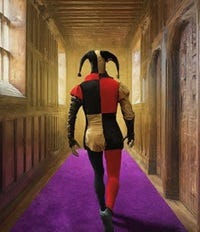That evening, after a somber dinner, Adon received the king’s summons to an early-morning meeting in the King’s Antechamber. Telling the Oldham siblings that they were on their own for its duration, he suggested they join Thesis at the Santinetta home. Soon afterward, he went to bed, sure the next day would be long and exhausting.
Assuming the Palace would be on a war footing for the foreseeable future, Adon dressed for the meeting in his uniform. He arrived a few minutes early, and it did not surprise him to see his sovereign already sitting at the head of a long table, drumming his fingers on its polished, wooden surface. Dressed in his Grand Marshal’s uniform, Lorens’ downcast eyes remained red, but his grief could not hide the sharp desire for vengeance that dominated his gaze. Looking up and locking eyes with Adon, the king beckoned to him, indicating he should take the chair to his right.
When Adon asked about his and the Queen’s health, Lorens waved it away. “You know me, Uncle,” he said gruffly. “I am broken inside—perhaps always will be—but the throne demands that I ignore my heart’s pangs of grief and act the king.” He spoke with neither irony nor self-pity. Flicking his thumb over his shoulder toward the Throne Room beyond, he said, “That seat allows for no self-indulgence. It crushes those who pursue it.”
“Until yesterday,” he growled, his brows descending sharply, “those infernal emanations were faraway phantoms. Now they are real, Adon! They have solidified into a poisoned sword, slaying my people, high and low, and despite my own loss, I must parry the thrust! I am bound by duty to strike back with such force that such a thing can never happen again! That is why we have convened here this morning.”

Adon glanced away from the king’s face, noticing that the other invitees had ceased conversing and taken their seats as the king spoke, listening intently to his words. To the king’s left sat the three marshals of the realm—Terosh Mortimor, Vytor Vash, and Paydon Telsiora—and Captain Baladan of the Palace Guard. The Prophetess Kanita, the Master of the Royal College, and Bishop Kaidmon, spiritual head of the Church of the Shepherd in Palisade, sat to Adon’s right. Margonne’s Steward, the aged Amantel Tilanta, took the seat at the foot of the table facing the king. Various aides filled chairs against the walls.
Marshal Mortimor, a man of average height and build with graying hair at his temples, leaned forward, hands clasped on the tabletop. “Sire, we on this side of the table are a bit perplexed,” he said. His fellow marshals nodded. “We assumed you had called this meeting to organize the muster of our forces against the rebel Leitani, but you have included others not associated with the kingdom’s army.”
Lorens’ face darkened. “You, all of people, should never assume,” he said curtly. “Never presume to know a king’s mind, marshal.” Turning, he nodded to Edgar, who, with a few helpers, swiftly laid the table with light fare and provided drinks to everyone. Adon noted the king drank tea this morning. Good, he thought. He has not yet resorted to wine.
After the servants departed, the king cleared his throat, instantly receiving everyone’s attention. “In the war that has fallen upon us,” he explained in a milder tone, “we cannot confine ourselves to our usual military doctrine, plans, and procedures. Yes, flesh-and-blood men will meet on a field of battle soon. In fact, our enemy has already spilled blood at the Sixty-Mile Station on the West Road. So, we will require our forces to defeat the rebels.
“But these cursed emanations,” he said, his voice becoming harsh, “the waves of evil that have rolled across our countryside and into our cities and towns, have also taken Margonni lives.” Pausing to collect himself, he inhaled deeply before continuing. “They are unfamiliar to us, a weapon we have never faced. Those who understand spiritual matters may help us understand them. So, I invited the Prophetess and Bishop Kaidmon to give us their insight. I also asked the Master of the Royal College to represent the learned among our people.”
Lorens shot Adon a glance. “Before that, Captain Santinetta will report on his trip to The Corner, where I sent him to investigate an oddity among the reports about the emanations. His tale will provide some background.”
Taking a swallow of his tea, Adon recounted the story of his last two weeks. He explained The Corner’s inconsistent report and thus the need to find out why the emanation’s effects were different there. Using broad strokes, he narrated their journey from Sergeant Genubah’s last-minute addition to their company to the murderous attack on Sixty-Mile Station, clearly the work of the Genubah and his rebel war party.
“As for my primary mission,” he concluded, “I believe the emanations override people’s consciences, so they act with little or no restraint. We saw that at the East Gate yesterday. As far as we know, only Mattan Oldham has been able—somehow—to both resist and remove the evil impulse from an emanation.”
With an apologetic glance at the king, he continued, “I cannot even begin to explain his ability or its origins—nor can Mat. Perhaps the Prophetess can. But Mat is just one young man, the kingdom is large, and the emanations seem to strike often and at random. Even so, we have learned one crucial detail: Using the reports to backtrack their trajectories, we traced the source to the Dragon’s Teeth Mountains somewhere near the old Leitani fortress of Essela.”
The Prophetess gasped, and the military officers nodded. Known for his aggression, Vytor Vash smiled broadly, appearing pleased to have a target for his troops. Several of the aides began discussing routes and times, as if the king had already ordered their departure.
Lorens’ bark of “Quiet!” brought the room to order. His steely gaze around the table conveyed his desire that disorder should not break out again. Lorens is just barely containing his rage, Adon noted with concern. He seems more eager for blood than Vash!
The king leaned back in his chair, gripping its arms tightly and taking another deep breath before he spoke again into the silence. “Our scouts and the garrison in Blayne have reported that they have noticed increasing numbers of young Leitani men traveling northeast, which supports Adon’s conjecture from the reports. Old Essela, it seems, is acting like a beacon, drawing Azuri’s faithful to it like moths to a flame.”
His eyes swept the room again, hardening. “I do not doubt those young Leitani will come down from the mountains as an army.” This time, the military men and their aides merely nodded their agreement.
“Sire,” the Prophetess said in a quavering voice, “may I speak? Perhaps I can add some context.” At the king’s nod, she began. “The king has heard my account of a vision I had nearly two weeks ago, in which I saw a Leitani warrior-priest praying before an idol of Azuri in the mountains. I am ashamed to say that I did not know that a Leitani priesthood even existed. We Prophetesses assumed it had died out, that Chogan was the last of them—and good riddance!”
She shrugged before continuing. “Perhaps this priest is the only one, a Ghostman who has studied the ancient magics of Azuri’s cult. But, gentlemen, even if he is alone, this new warrior-priest is terrifying! He has revived the practice of Nididzna Ajodzi, the Breathing Curse, and somehow intensified it beyond anything our histories record. The emanations or waves of evil are massive Breathing Curses.”
“Can you describe them for us?” Lorens asked, leaning forward.
Prophetess Kanita bobbed her head. “Yes, lord. Our histories say that, in the old days, a person or chief who wanted to curse an enemy would hire a Ghostman priest to make a sacrifice, beseeching Azuri to blow on his enemy with the breath of his mouth. Most sacrificial altars to Azuri were made like a large metal pot with a grotesque depiction of the demon’s face with pursed lips, as if the idol were blowing. If Azuri granted the request, the books say, a small emanation would flow from the idol’s lips and pursue the object of the curse. Usually, once it overtook the victim, he would go mad and kill himself or be killed.
“This warrior-priest is invoking a variation of the Breathing Curse to make his enemies—the Margonni—go mad and fight themselves. This explains why the Leitani are immune to them. He’s sending out huge emanations to strike as many Margonni as possible wherever they may. I assume he points the idol’s lips in the direction he wants the emanations to go. It is not an accurate method, but an effective one. He’s likely been trying to hit Palisade from the first.”
“Could he invoke a curse on a particular person, like the king, as in the old days?” Adon asked, alarmed.
Kanita swallowed. “Yes, but I think Essela is too far away for that. Usually, the sacrifice for the curse was performed as close to the victim as possible, within a few miles at most. But these new emanations are so large, I am beginning to think this warrior-priest is far more powerful than the ancient priests ever were.”
“So, you believe the king is not in danger?” Captain Baladan asked.
She shook her head. “Not from a personal emanation. But, as a Margonni—the Margonni—he is certainly in danger from these large emanations.”
Next to her, the Master of the Royal College drew up his stooped form and looked at the military men across from him. “This all sounds like Leitani gibberish to me. Curses! Magic! Sacrifices! Ghostmen! Priests! Can anyone verify what this Leitani woman says? It is all old tales and superstition!”
Lorens’ eyes turned dark and dangerous. “Do you deny what happened yesterday at the East Gate, Master?”
“Did anyone here see this ‘emanation’?” he asked, oblivious to the king’s mood. “It could have been simple mass hysteria brought on by the crowding and conflict in the gateway! Ancient doggerel, myths, legends, suppositions—that is no way to establish facts. This phenomenon—whatever it is—needs to be studied, analyzed, experienced by the learned before we can confidently speak of it.”
“Well, then, Master,” Lorens said evenly though glowering at the scholar, “you will accompany the army to Blayne and study, analyze, and experience the emanations to your heart’s content.” The Master’s eyes widened in sudden terror, and he shrank back into his seat in disbelief.
“Bishop Kaidmon, do you have any comments regarding these emanations?” the king asked.
The bishop bowed his head toward the king. “Blessings to you, sire,” he said with a beneficent smile. His deep, rich voice evinced his oratorical training and many sermons. “I will admit to knowing nothing certain about these emanations. As you may know, the Church of the Shepherd has not seriously concerned itself with such things for centuries. Even so, our Scriptures clearly testify of unexplainable doings—miracles—in the distant past, performed in truth by the Shepherd Himself and feigned by the diabolical Enemy. Most of the upper clergy teach that the time of miracles is past, as they were witnesses of the Shepherd’s power and love for the time when men were simpler. But in these days of enlightenment, such displays are no longer necessary. As for the Enemy’s so-called wonders, which these emanations appear to replicate, they were devilish attempts to match the Shepherd’s spiritual might, but they could only deceitfully mimic it.”
Lorens interrupted when the bishop took a breath to continue. “Thank you for clarifying the Church’s stance, Bishop Kaidmon,” he said with equanimity, though Adon recognized the impatience and distaste in his eyes. “I think we have exhausted what our religious leaders can tell us, and we can proceed to organizing the muster. Lady, I thank you for your help today. Gentlemen.” He nodded to the two men, who rose and bowed.
The Jester is a clean YA fantasy novella about a young man with many interests and skills who yearns to discover what he does best. First, however, he must figure out who stole the king’s dagger, and along the way, he experiences adventure, entertainment, and perhaps a wee bit of romance! Click here for the first episode!
“Sire, may I stay a little longer?” Kanita asked with an apologetic smile. “I wish to propose a pledge of my people’s support in the kingdom’s efforts.”
The king did not hesitate, nodding and waving the Master and the Bishop away. “What is your proposal, Prophetess?” he asked once the men scuttled, nonplussed, from the room.
“You are aware, my lord,” she replied, “that my people have long rejected Azuri and the old ways of the Leitani. Though we do not share your blood, we consider ourselves Margonni by choice. So, we wish to send a few score of our men with the army, not as soldiers but as scouts and physicians and,” she lowered her eyes and her voice, “spies.”
Lorens tilted his head at the last word. “Spies? What do you mean?”
She flushed. “I realize spying is a sensitive topic, even shameful, but you cannot deny your ranks are full of Leitani. I pray they are loyal, but in a war against other Leitani, each one is suspect. You will, of course, have to decide what to do with them. I propose you scatter my young men among them, and they will do the distasteful job of reporting any suspicious speech or activity to your officers. Sergeant Genubah may be just one among many who have remained in the ranks to cause havoc at a critical time.”
“Is that not a betrayal of your people?” Marshal Vash asked. He was himself not a full-blooded Margonni, as his ancestors came from Haimar to the west.
“Marshal,” she answered, raising her eyes to his, “blood is not as important as belief, though many often claim otherwise. We who follow the Creator do not believe in rebellion but in submission to the rightful king. Our brothers are not those who share our blood but those who desire to return peace to our nation. So, no, we are not betraying our people, for our people are our fellow Margonni.”
Turning to the king, the Prophetess said, “We ask your permission to join your muster. And I desire to accompany you.”
A note:
The marshals of Margonne descended from three of the kingdom’s original dukes, close companions of Margonne the Strong: Brien Mortimor, Zavon Vash, and Erasto Telsiora. Mortimor and Vash commanded infantry regiments, while Telsiora led a half-regiment of cavalry and another of archers. Typically, the Steward, Amantel Tilanta, who was also Duke of Palisade, would be responsible for defending the capital and training recruits, but he was well past the age of bearing arms. His capable heir, Varad, a strong, doughty man of thirty years who was said by some to be a throwback to Margonne, would handle most of his wartime duties.
If you have enjoyed what you read on this Substack, please consider buying me a cup of coffee!











Very astute of the Prophetess to see the possibility that there may still be Leitani spies in the ranks.